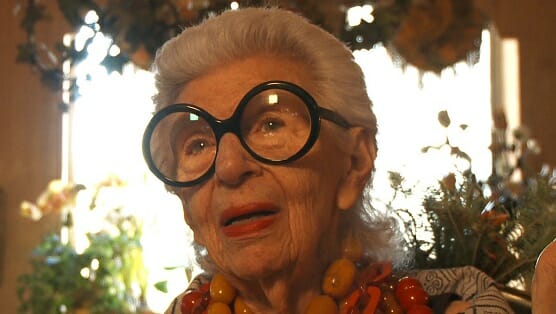Iris

About a half hour into Albert Maysles’ Iris, the late, great filmmaker takes his viewers on an open house through the gloriously untidy apartment of his subject, fashion maven Iris Apfel. She glides from place to place before sidling up to an unwieldy statue made in the image of a turkey. A Kermit the Frog puppet adorns the great bird, wearing his perpetual heartening smile. “That’s Gussie,” Iris casually tells the camera, as though Maysles and his viewing audience should already know the creature’s name. “Gussie is a bar. Her wing goes up, and her belly is full of booze.” She demonstrates Gussie’s impressive functionality before adding, “And Kermit decided he’d like to live here, and he’s become a terrible lush.”
And then the film goes on, Iris’s offhand irreverence is left unexplained. But the joy of Iris Apfel, and by extension of Iris, is that there’s no need to dissect the enigma. Iris is a character, through and through. If you saw her in a narrative film, you would fall in love with her as part of the interlocking elements of its mise en scène. In point of fact, if you’ve seen, say, Brad Bird’s The Incredibles, then you probably already have. (Superheroic fashion designer Edna Mode is a composite of many real-life fashionistas, but you can find traces of Apfel in Edna’s accoutrements, particularly in the breadth of her face-obscuring glasses.) She’s unfailingly chill, regarding the world around her with snappy, quip-happy serenity.
-

-

-

-

-

-

-

-

-

-

-

-

-

-

-

-

-

-

-

-

-

-

-

-

-

-

-

-

-

-

-

-

-

-

-

-

-

-

-

-








































